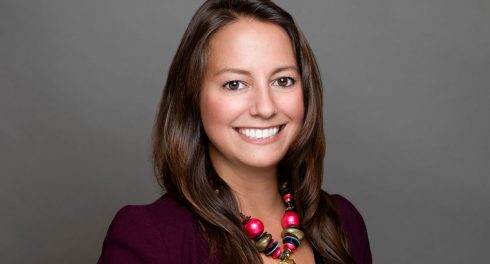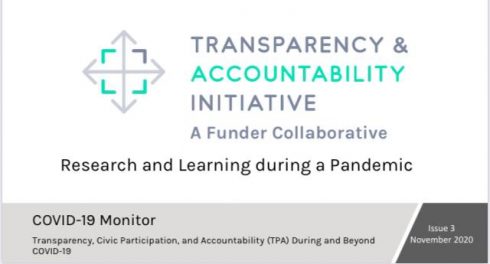Born and raised in Lima, Peru, Mario Picon’s initial career plan was to be a macroeconomist and financial programming expert, but a series of field experiences in the Amazon area and the Andes sent him in a different direction, and he has never looked back. Today, he serves as the Program Director of the Leveraging Transparency to Reduce Corruption initiative at Results for Development (R4D).
Welcome Mario! Please tell us more about yourself, your interests, and your commitment to supporting the work around transparency, participation, and accountability (TPA)?
Hi everyone, and thank you, TAI, for the opportunity to connect with so many people and organizations fighting for transparency and accountability. I have the pleasure to lead a team of dedicated people under the newly redesigned LTRC (Leveraging Transparency to Reduce Corruption) program. Our program exists to support the efforts of governance and anti-corruption champions in the extractive sector at the global and country levels.We promote research, knowledge brokerage, and testing of solutions to existing challenges and to bridge implementation gaps in recent or current efforts. We look at the opportunity to build together with local stakeholder’s strategies that build broad coalitions, coordinate TPA efforts, and design new interventions that respond to context.
My first experiences on the value (and the lack) of TPA in a country came, however, during those formative and early career days. Those were the waning days of the Fujimori regime, and I experienced firsthand the power of peaceful protest, as well as the pressures public officials face. One of my first jobs involved producing the official unemployment figures. The first time I crunched the numbers, no matter what I did, the figures were significantly larger than what the most recent official ones were. Soon I understood that did not matter; the final figure to be reported as the official had already been decided at a higher level. I brought the numbers to my boss, the head of research studies at the ministry, puzzled because over 4 points larger unemployment over the last three months did not make sense. She smiled and told me: “if this is what you found, this is what we will report to the Minister.” So we did, and 30 minutes later, we got a call from his office telling us that the number to be published was 7.1% (the number I got was 11.3% or so). My boss told me, and I never forget: we will publish as told but be sure to spread the word, I will do the same. This was, of course, way before Twitter. I never knew at the time that I was going to have the chance to inform and influence TPA strategies. But when I got the opportunity, I remember those days, and that definitely inspires me, and I think helps me be more empathetic with people in the front lines of anti-corruption.
My work in TPA has given me the opportunity to learn from, and hopefully help, extraordinary women and men in several countries. I always remember those first experiences and understand the difficult circumstances in which those champions work.
![]() Prior to your current role, youmanaged impact evaluations. What is the role of evaluation and learning in TPA, especially in helping you to generate and adapt evidence to local context?”
Prior to your current role, youmanaged impact evaluations. What is the role of evaluation and learning in TPA, especially in helping you to generate and adapt evidence to local context?”
I think a more useful response will focus on evaluation in general and learning, rather than focusing on impact evaluation specifically. Impact evaluation is a powerful tool to assess attribution of the observed effects of an intervention, program or policy. That can be key in informing new programming, and advocate for promising interventions in new settings, or scaling up. But impact evaluation is not the only source of information that could or should guide policies and programs. For starters, when doing impact evaluation, the outcome variables measured need to be reasonably tied to what is evaluated through a well-thought and detailed theory of change. The time over which the impact evaluation is taken should reasonably allow to observe impact over your objective variables. And an open conversation around what statistical significance means and if a program is cost-effective or not is fundamental.
On issues like TPA, which are so dependent on politics and the environment in which interventions take place, any effort to assess attribution needs to be strongly complemented by qualitative and political economy analysis. Otherwise, proper adaptation of programs to new context is hardly possible. The question should not only be if program X works, but “how do we make it work better”; and “how sustainable the results, when achieved, are”.
How important is collaboration among field actors to the work you do around open governance and the future of natural resource governance? Are there instances where such collaboration has made a difference to your work/program?
Every.single.time. That is probably the single most important factor in building a promising strategy and sets of solution to combat corruption through TPA. We deal with amazing people, leading amazing initiatives with much knowledge of the country or problem they are tackling than us. But because they are experts in what they do, and using the tools and means they master, they may miss the perspective from a different stakeholder that can truly be a game-changer in terms of their organizations’ impact.
We provide and foster a space for sharing perspectives on common challenges, and for building broad coalitions of change. We do this at the country level and now we are attempting to do the same at the international level.
A few examples may help visualize this. In Mongolia, we foster a dialogue between organizations with different expertise and stakes around the issue of beneficial ownership, and we together came out with a more systemic view of the problems with the existing strategies; looking at the ecosystem for Beneficial Ownership in Mongolia and identifying entry points to tackle persisting challenges with it. In Nigeria, one of our partners will have a chance to enhance its community-level messaging strategy thanks to a collaboration with us and a network of NGOs. And at the international level, our recent Future of Natural Resource Governance dialogue is leading us to emerging partnerships on issues such as energy transition and role of investors.
Collaboration builds better perspective and potentially a stronger push for common objectives.
What do you find most exciting and frustrating about working in the TPA field?
The energy, the drive of the stakeholders involved motivates us every day. And I speak of everyone from the small and local NGO to the international players or coalitions. I am also excited at the opportunities lying ahead for the field. We are learning from the shortcomings of the past, of the need to go beyond atomized interventions and programs; we as a community are bringing a much-needed wider perspective of the issues TPA tries to address and of the immediate outcomes pursued: service delivery, prevention of corruption. And I would say, most importantly, of the need to coordinate efforts from the grassroots and from above to achieve larger impact.![]()
And in terms of what frustrates me, I’d rephrase it to say that we as a community face a few very difficult challenges. First is apathy, or lack of trust from many in the possibility of things to change, let alone in the effectiveness of a transparency intervention, or the promise of effective accountability; this undermines any effort we as a community make, but we must accept it as a consequence of an environment where TPA has not been the norm.
The second is that we need at all levels to ‘change the chip’ in the way we understand TPA and what we are trying to achieve. Transparency is not the goal, it is a means, and with progress that may be fragile. Transparency impact is not achieved through a law, a regulation, or a registry, but with the triumph of a culture of accountability, where citizens are engaged, and there is progress towards an ecosystem that makes TPA benefits tangible and sustainable.
Who are your mentors and how have they impact the way you work?
There have been several people that I learn and draw inspiration from. Among the people I work with, Norm Eisen’s optimism and drive, as well as Dani Kaufmann’s pursuit of excellence and impact are strong influences. Sara Pacque-Margolis showed me what being a good manager is, and the difference it makes. Academically, Dave Crocker’s democracy and participation work, and Carol Graham’s happiness and subjective well-being work marked me. But at the most fundamental level, in their contribution to the person that I am and the values I hold, I will be always thankful to my parents, and for who they are and the sacrifices they made so I can have the opportunities I have.
What would you change about yourself if you could?
Well, I would say one of two things. Either to optimize my use of time, or make my body need (even) less sleep to operate!! It frustrates me a bit not having as much time as I would like to do more reading and learning in areas beyond our core business, because I believe in that as a great way to stimulate creativity. Oh, and I still dream of learning to play the guitar, one day!!
Catch up with Mario on Twitter at @mariogpicon and get more update on what Leveraging Transparency to Reduce Corruption initiative & Results for Development is up to at @results4dev


